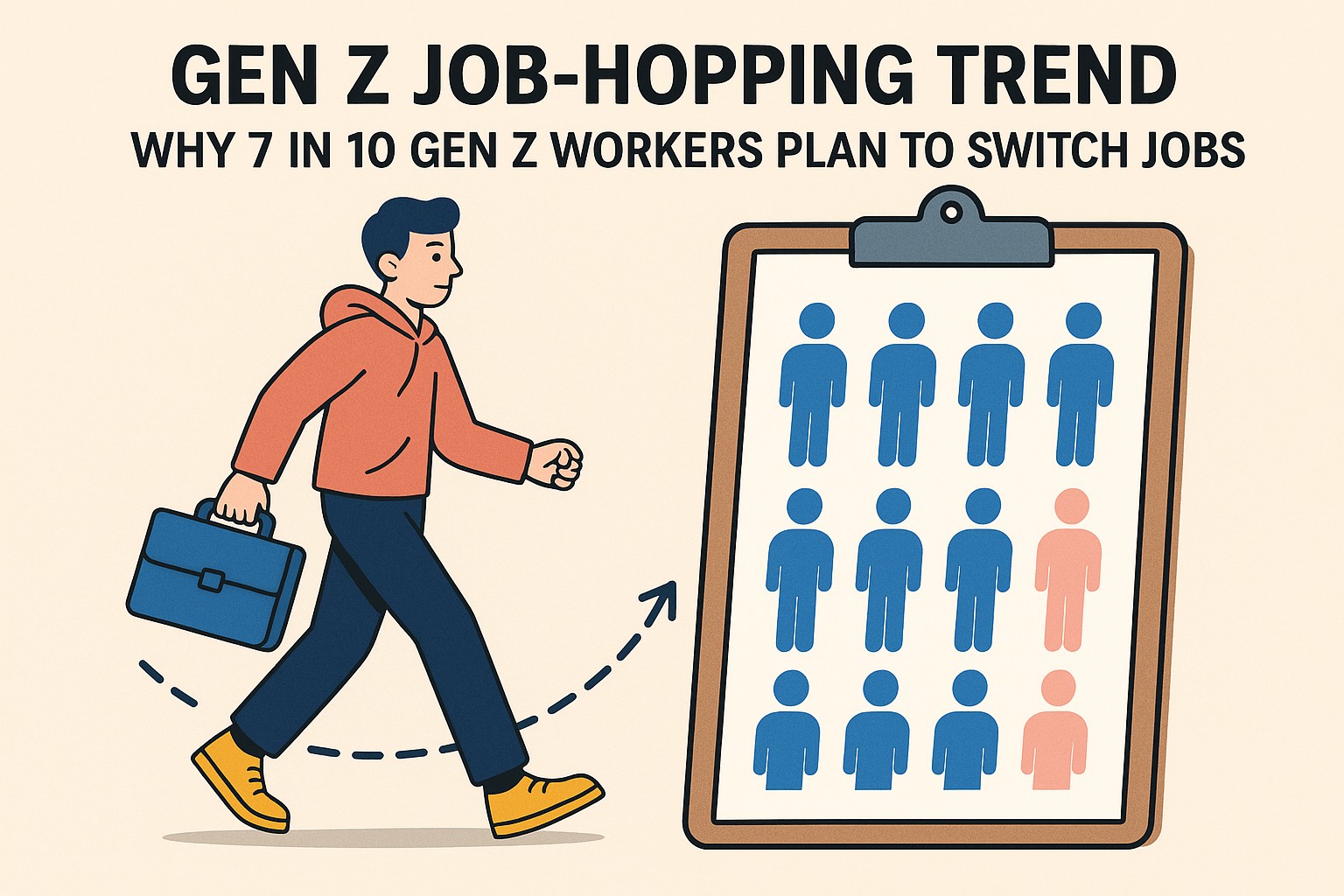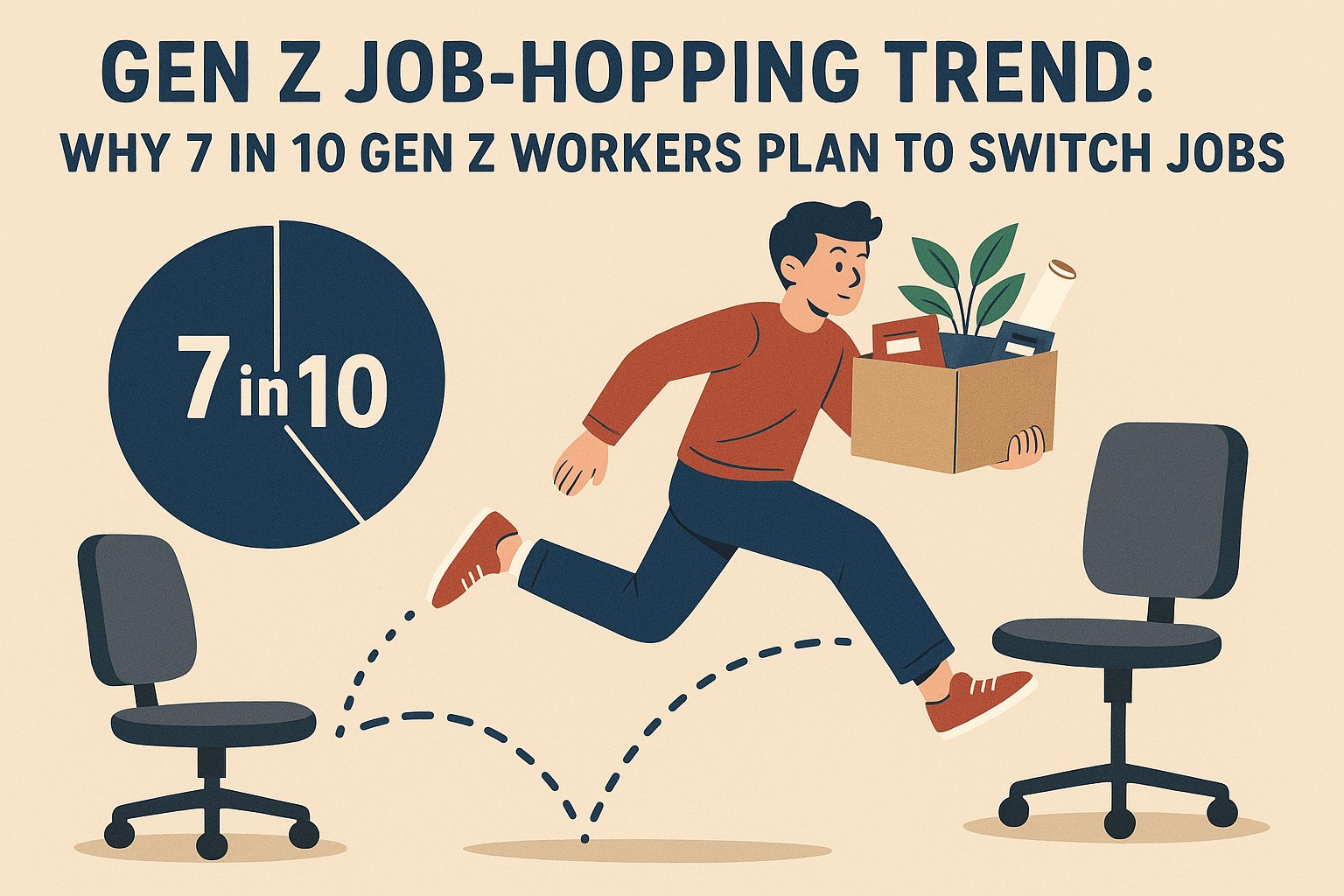The Gen Z job-hopping trend is making waves across industries, and not in the way employers might hope. According to recent surveys, nearly 7 in 10 Gen Z professionals in India are planning to switch jobs in the near future, with better pay being the primary motivator. This trend is shaking up traditional workforce expectations, raising concerns among employers about retention, and presenting an evolving set of challenges as younger generations enter the workforce.
What is Driving the Gen Z Job-Hopping Trend?
There is a growing trend of job-switching among Gen Z workers (individuals born between 1997 and 2012), and the reasons behind this shift are multifaceted. One of the key drivers is the need for better pay. According to a survey by Deel, nearly 70% of Gen Z employees are willing to leave their current positions for higher salaries. But it’s not just about money—career growth, work-life balance, and the desire for meaningful work are also major factors.
For Gen Z, salary is just one part of the equation. They are more likely than previous generations to demand work that aligns with their values and offers long-term career growth. According to a Times of India report, 63% of Gen Z workers are ready to quit a job if it doesn’t align with their personal values or if they feel their career progression is stagnant.
Key Insights on the Gen Z Job-Hopping Trend:
-
7 in 10 Gen Z Workers Plan to Switch Jobs: A significant portion of young professionals is looking to make a change, citing reasons such as dissatisfaction with salaries and a lack of opportunities for career growth.
-
Better Pay and Career Growth: High salary expectations are a driving factor, with 3 in 5 Gen Z workers willing to switch jobs for better pay. These workers are not just chasing the paycheck; they also seek a trajectory for career advancement.
-
Impact of Job-Hopping on Employers: Employers, both in India and globally, are expressing concerns about the impact of job-hopping on long-term company culture, productivity, and retention. Frequent turnover may disrupt team dynamics and result in a loss of institutional knowledge.
-
Cultural Shift in Expectations: Unlike older generations, Gen Z values flexibility, work-life balance, and a sense of purpose in their roles. Companies that do not offer these benefits might find it harder to retain young talent.
-
Digital Natives Seeking Better Opportunities: Gen Z is the first generation to grow up with technology at their fingertips. As digital natives, they are more likely to seek out tech-driven roles and are highly adaptable. While this provides employers with access to a highly skilled workforce, it also means they may be transient, seeking new opportunities more frequently.
-
Potential Backfire: Industry experts like Janet Godwin, CEO of ACT, warn that constant job-hopping may backfire for Gen Z, ultimately affecting long-term career development and financial stability. Constantly changing jobs could result in a lack of deep experience, making it harder for young professionals to gain the leadership skills required for career advancement, as noted by McKinsey & Company here.
Why Are Gen Z Workers Switching Jobs?
The reasons behind the Gen Z job-hopping trend are not merely financial. Younger workers are driven by several factors, and their expectations from employers differ greatly from previous generations. Work-life balance and flexibility are among the top priorities for Gen Z. They have grown up in an era where digital tools allow for more remote work opportunities, and they are reluctant to return to rigid office hours.
Additionally, career growth is a crucial factor. Many young professionals feel that they are not receiving the mentoring or career development they need in their current roles, which leads them to seek new opportunities. According to Live Mint, 60% of Gen Z workers expect to see clear growth trajectories at their workplaces and are not afraid to leave if they feel stagnation sets in.
What Does This Mean for Employers?
As Gen Z continues to make up a larger part of the workforce, employers are tasked with adapting their strategies to meet their demands. The Gen Z job-hopping trend presents challenges for companies looking to retain talent, but it also offers opportunities to improve employee engagement and create more dynamic work environments.
Employers can combat the Gen Z job-hopping trend by:
-
Offering Competitive Salaries and Perks: Companies need to be more flexible with compensation, providing competitive salaries and attractive perks to Gen Z workers. For instance, a report by The Economic Times highlights how organizations are focusing on better pay packages to tackle this trend.
-
Fostering Career Development: Employers can introduce mentorship programs, skill-building workshops, and leadership training to show that they are invested in the career growth of their younger employees.
-
Creating a Purpose-Driven Work Environment: Gen Z is more likely to stay at companies that offer meaningful work. Businesses that align with social causes and promote positive company cultures will attract and retain Gen Z talent, as suggested by Business Insider here.
-
Providing Flexibility: Offering remote work options and promoting a flexible work environment can help reduce turnover, as Gen Z highly values the ability to control their schedules.
The Future of Gen Z in the Workforce
The Gen Z job-hopping trend is not necessarily negative for employers. It signals a more ambitious and dynamic workforce, one that values personal growth and work-life balance. However, it also means that companies need to shift their approach to employee retention and satisfaction. By adapting to the needs and expectations of Gen Z, businesses can cultivate a loyal, productive, and highly motivated workforce.
For now, it’s clear that Gen Z will continue to drive this job-hopping trend, and employers who fail to meet these expectations may face higher turnover rates, impacting long-term organizational stability and growth.


